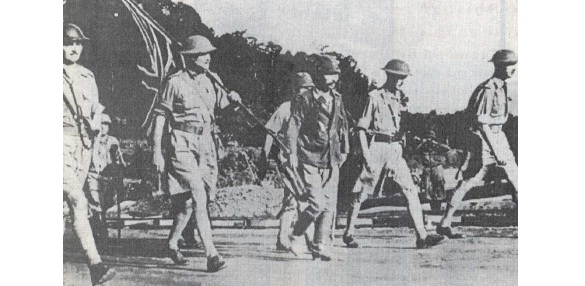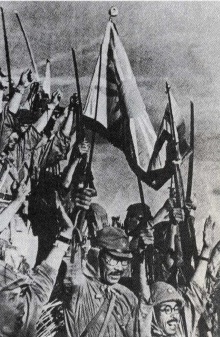by David Tharp
The Mall, London— The old British veteran, a former POW who survived slave labor on the infamous Thai-Burma death railway, put a lighter under a Japanese flag and lit it. As the flames and smoke rose from the burning Hi-no-Maru, a young London constable moved towards the old man to arrest him.
He managed to grab the elderly man by the arm, but a firm, collective shout went up from the crowd witnessing the scene on the famous Mall near Buckingham Palace.”Leave him alone!” they cried, and wedged themselves between the constable and the old man. “But, I’ve got orders to stop any disorderly conduct,” sputtered the young policeman in his defense.
A British woman shouted back sharply, “We will not let you have this man and that’s an end to it. Get out of it!” The young bobbie backed off in shock and the determination of the crowd and got on his radio to report the disturbance to his superiors. The old man was left alone, but the commotion from the incident continued with threats to torch more Japanese flags until the carriage of Queen Elizabeth and Emperor Akihito came in sight.
The old veteran and hundreds around him turned their backs as the carriage drew closer and they started whistling “Colonel Bogey March,” the theme music from “Bridge on the River Kwai,” the film about the treatment of British POWs who died helping to build the death railway.
I was positioned so I could see both the veterans and the faces of the Emperor and Empress Michiko. Unfortunately, the old veterans may have been outflanked. The Emperor and Empress sat on the opposite side of their carriages from the hundreds of veterans who made their symbolic protest.
British and Japanese officials may have made the seating arrangements knowing that the veterans planned to be on a strategic corner where the carriages come out of the Horse Guards parade ground to turn onto the Mall for the short ride to Buckingham Palace.
But, if the Emperor missed the affront, Japanese officials riding in the carriages behind the Queen and Emperor were visibly shaken by the sight of the veterans turning their backs and holding up sashes that read “Prisoners of War.”
A widow of one of the veterans held up a sign that read: “You were not THERE, Blair,” a critical reference to remarks made by Prime Minister Tony Blair to give the Emperor a “warm welcome” to Britain, and keep protests “dignified.”
The old POWs, most of them in their 70s and 80s now, want a full apology and compensation for their barbaric treatment in Far Eastern labor camps during the war. Neither the British nor the Japanese governments have responded to these requests from labor camp survivors.
“I’m ashamed at my government’s treatment of the veterans,” said a British woman bystander who went to the aid of the aged flag burner. “They put their lives on the line and all they got in 1951 was an insulting £76 in compensation for the cruelty they endured during the war.”
“They are cynically waiting for us to die,” C.W. Holtham, 77, former head of the Japan Labour Camp Survivors Association (JLCSA), told Weekender. “We protest this treatment by the British and Japanese governments.”
But the veterans said they have no personal animosity against Emperor Akihito. “Unfortunately, he’s the symbol of Japan. We tried to talk with the Japanese government about compensation and they won’t listen to us. So it’s logical for us to protest against the country’s symbolic head,” said Arthur Titherington, 76, current president of the JLCSA.
“Other Japanese leaders such as Takako Doi have met me and expressed their understanding of our position on compensation based on humanitarian grounds,” added Titherington, “but Prime Minister Hashimoto refuses to see me. So does Tony Blair.”
But, the Prime Minister— dubbed “Nissan Blair” by the local press—finally realized last week that his ministers and chief spin doctors had misjudged the ex-POW problem.” He’s been badly advised,” said one Labour politician.
So, yielding to bad press cuttings…er, I mean to humanitarian concerns…the Prime Minister finally promised last week to have his first ever meeting with Titherington and some of his prison camp survivors within two weeks of the Emperor leaving Japan.
Ironically, by comparison Blair went to great lengths to apologize to Ireland this past year, quite rightly, for the British government’s role in the catastrophic early 19th-century potato famine that wiped out a million rural Irish men, women and children.
Logically, it makes sense if we’re talking about genuine humanitarian sympathy for the dearly departed people of Ireland, and not thinking, God forbid, in a cynical political way of opinion polls and all those lovely “Yes” votes we can get from Republican nationalists in Northern Ireland for the recent peace negotiations—
Then, surely true humanitarian feelings should have won out and the Prime Minister would have been anxious to see the POWs long before this past week, because—it’s simply the decent thing to do. Not to mention the case for tact, diplomacy and sensitivity towards men who put their lives on the line at a particularly dark time in history for Britain.
But, strangely, a collective history amnesia seems to afflict Downing Street and the Foreign Office over these POW survivors of more recent “troubles,” the slight falling out some of us less elite mortals refer to as World War II, in which our Japanese friends played a somewhat modest role.
So, it is a victory of sorts for the dishonored and ignored old veterans to finally see Blair. They just wanted to be treated fairly and honorably by a British bureaucracy that hasn’t shown the slightest inclination to help them with their compensation claims and official apology from the Japanese government.
Therefore, the British government have only themselves to blame for the near fiasco surrounding Emperor Akihito’s visit. They could have easily avoided the embarrassment of the boos, rude gestures, flag burning and protests both in London and Cardiff against the Emperor—if only the out-of-touch politicos and bureaucrats had shown less concern for their careers and possible knighthoods and displayed more common sense and human consideration.
Kazuo Chiba, Japan’s former ambassador to Britain, didn’t help matters by his remarks about the veterans’ protests. In one of his many ill-conceived comments, he laughed off the demonstrations by saying, “The press in Japan are more interested in the World Cup,” and thereby single-handedly destroyed the sincere efforts of decent, hard-working Japanese diplomats trying to put a positive spin on the Emperor’s visit and better Anglo-Japanese relations.
Some of the British press didn’t help matters either. The mass circulation newspaper The Sun contributed to the mindless continuation of negative Japanese stereotypes by describing last week’s protests as the “Jap Row.” Thanks to blundering, primitive racist headlines such as this in the British media, how much painstaking work by British diplomats and private citizens in Japan to build bridges of understanding over the years got wiped out?
Two of my uncles serving with the British Army in WWII were captured in Singapore by the Japanese in 1942. Thrown into a POW camp, they were then transferred to a forced labor camp where they worked on the infamous Thai-Burma “death” railroad.
Miraculously, both survived physically, but many of their friends died from disease, malnutrition and the brutal treatment of their Japanese guards. They arrived back in England mentally crushed men. It took years for them to recover medically, but they never felt “normal” again.
They had horrible nightmares and said they couldn’t tell “civilized people” about their wartime experiences. They died very sad, unhappy men.
Some years after their death, I visited England from Tokyo where I was studying at the time. I met one of my uncles’ family members and talked enthusiastically about life in Japan and how much I enjoyed the culture.
“Culture?” he scoffed. “I’ll show you Japanese culture,” and walked to his bookcase and threw a book at me. The book was about Japanese atrocities in WWII.
British relatives refused to listen to my stories about Japan, and ignored my requests not to use the word “Japs.” They considered me a “Jap lover.” The depth of their anti-Japanese, negative feelings deeply saddened me.
Our families had been bombed by the Luftwaffe on a daily basis during the war, but they did not have the same ferocity of feelings about the German people as they did for the Japanese. In particular, Emperor Hirohito and General Tojo were the main symbols of Japanese cruelty.
It’s a cruel irony to the POWs that Tojo is being lionized as a hero in the latest revisionist film released in Japan and reviewed by James Bailey in this edition of the Weekender.
“Some cynical Japanese want to make Tojo out as the benevolent liberator of Asians from white men’s colonial rule. But, does any intelligent Japanese really think their government at the time was going to hand over the oil fields and natural resources of those countries to the locals and just walk away like Mother Teresa?” asked a former POW.
So, today when I speak to former British POWs of the Japanese Labour Camp Survivors Association, their bitterness doesn’t surprise me or strike me as out of touch with modern times—rather, it’s equally a reminder that British governments cared very little about their pain and suffering in all these years after the war.
And, in spite of all this old trauma, yes we must move ahead. As one young British woman, too young to remember the war, said last week: “There’s nothing to be gained in allowing a dreadful piece of history to compromise the future.”
Arthur Titherington of JLCSA strongly agrees—and, he compares the POWs’ claims to the Japanese-Americans who were put into concentration camps in the States during the war. “They finally received compensation and an apology from the U.S. government for the violation of their human rights. We at least deserve the same treatment,” he said.
Sadly, these former British POWs and Emperor Akihito both have one thing in common: They are both prisoners of the politics of their respective governments—helpless pawns in a drama controlled by people driven by pride, vanity, power and fear of political failure.
It’s a key point in psychotherapy that a new start in a person’s life can’t be made without looking at the past to see what has created the present problems. That is not happening in a humanitarian, responsible way, in regard to these British ex-prisoners of war. The U.S. government recognized that Vietnam veterans experienced traumatic stress from their participation in a dirty war, and still pay out compensation to the men whose lives were ruined by it.
These British POWs suffered far worse in Japanese captivity. What kind of societies deny a just request to treat old soldiers like them with honor and respect for their sacrifices?










